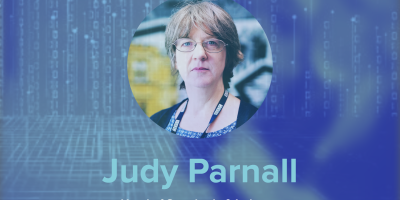Interview
In relation to our seminar on January 25th, we have asked Judy Parnall, Head of Standards & Industry at BBC to share her perspectives and insights on the digital future of the media, both the possibilities and the challenges regarding navigating in a new reality and its many digital tools.

What would you describe as the most important changes in the media industry regarding digital transformation right now – both difficult and positive changes?
The shift to Internet Protocol (IP) is a vast technical challenge with huge opportunities for new outlets and ways of working but the capacity for a lot of technical debt going forward.
Whilst bringing forth more platforms with the ability to offer media flexibly, more accessible and in a tailored way, each organization will need to fight harder to ensure content is sent and consumed as trustworthy news.
Synthetic and Generative Media and Virtual Production – as we move Metaverse-wards – can bring great new tools to deliver news to audiences and to create new ways to show that content, whilst bringing the danger of fabricated “news”. This increases the need of effective fact checking.
The increase of Cloud Based Production, 5G and improving latency bring greater opportunities for dispersed teams, with the strengths of contact on the ground combined with the weakness of losing the newsroom.
This will also improve making ‘live’ work and understanding, in a digital world, and it will be important to address the differences, both editorial and technical, between on-demand and live experiences to ensure the potential of each is maximized.
What should media executives and employees be most aware of and look forward to?
They should be aware of new capabilities delivered by IP as mentioned above – aiming to be ‘first’ with innovation, whilst ensuring that they provide value. The speed of evolution in generative media and Artificial Intelligence / Machine Learning and how new tools can be integrated in news production while helping audiences understand their impact.
In relation to the metaverse – where are the content opportunities? How can media deliver them? And how do they want to position their news on these platforms and increase their reach?
There is a need to engage with regulators on online safety, and sustainability in supply chains will be a big preoccupation. Media executives will increasingly have to account to the wider public for their news media’s consumption patterns.
In short, IP allows media to be easily shared and viewed on different platforms and devices, and for devices to communicate and exchange information via the internet.
In your opinion, how are AI and other similar digital tools going to affect the work of journalists?
Some work will simply be sped up for example translation, transcription, search, image improvement and some will be automated potentially vision mixing, adding thumbnails, etc. Predictive Journalism will start to yield stories by analyzing data sets to predict events and Large Language models will be a creative partner, helping us generate text. Other Generative Media advances will help us generate images.
We will also experience how recommender systems will enable us to help audiences access relevant content in a new age of ‘curation’. Metadata will be extremely important as will data in general and harnessing its power and insight.
Furthermore, AI driven immersive content will make for more memorable, engaging content experiences. You won’t just watch the space shuttle land, you’ll be able to put on a headset and land it.
How are these technologies going to change the newsroom as we know it?
Journalists will need to be more confident with these technologies as machines will start to work to inspire us as creative partners as well as doing our ‘grunt work’. Deadlines will start to fade, and journalists will be able to interrogate sources across many language-areas to enrich their stories.
How will the new technologies affect how people consume and relate to news?
They won’t only send ‘relevant’ content but also relevant ‘versions’ of content, for instance with different levels of depth or background information. Audiences will be able to have a more two-way relationship with news providers both by being able to comment, share and take action on stories, but also by engaging in immersive experiences.
What is your perspective on how media companies can strengthen trust in a digital age that also entails disinformation, deep fakes, AI, and competition from tech giants?
Editorially we need to be robust and clear in debunking disinformation and showing our working. Even for those who will not see, if we can be clear, discursive, and calm in our assertion of ground truths, people will understand that they are there when they want to engage with them.
We also must find ways to engage with the communities of rejectors, conspiracy theorists and the anxious by demonstrating our impartiality, try to understand what drives them and offer support. “Media provenance signals” will become especially important to help people know where a piece of media came from and as a result whether it is trustworthy.
Looking into the coming 10 years – do you think ”traditional” media will adapt properly and keep up with the pace of the digital development?
History tells us that generally traditional industries with complex infrastructure lag exercising maximum technological potential. Some will do better than others. –
One key distinguishing factor will be how much genuine technical knowledge they have right at the top of the organization and how prepared they are to use that advice and create first mover advantage from it.
There can be some risk in being a first mover, as not all technologies will live up to their promises and some platforms may not gain traction with audiences. But the rewards can be great in terms of better working and new ways to reach audiences.
Kontakt:
Josefine Anker
Presse- og kommunikationskonsulent



























































































